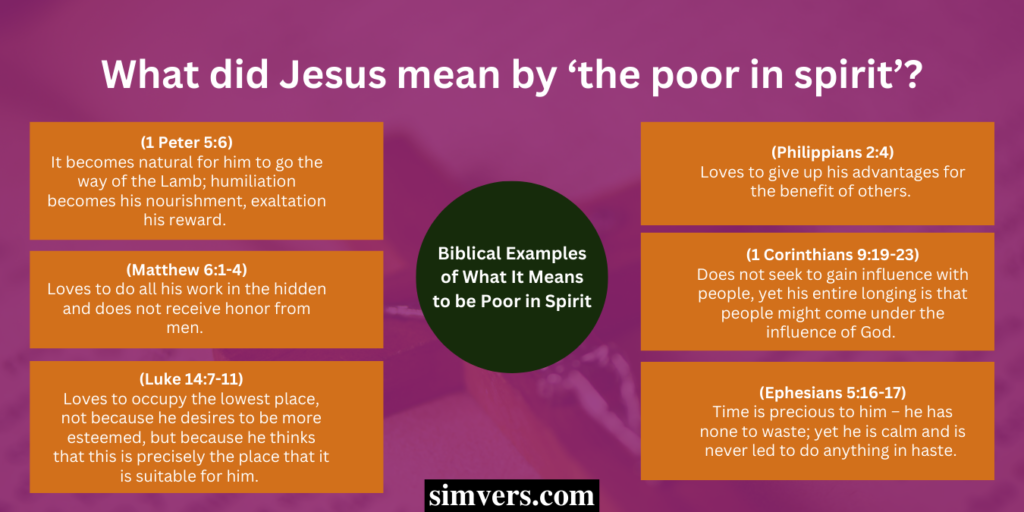
If you are conversant with biblical verses and passages, you will understand that sometimes, it is wrong to take certain phrases and expressions at face value. While these expressions come in clean-cut English, they have different connotations and interpretations. One of these verses is the topic of discourse in this article.
Blessed are those who are poor in spirit, for theirs is the kingdom of heavens, is a popular verse in the Bible. However, what does the verse mean, and does it contain teachings that could impact Christian lives? These are some of the questions we seek to answer in this article.
The Background
The four gospels of the New Testament, Matthew, Mark, Luke, and John, present Jesus’ life and ministry on earth from various angles. Jesus Christ, the Savior, is revealed as the King in the Gospel of Matthew, making it the gospel of the kingdom.
Jesus came to establish a spiritual kingdom, the kingdom of the heavens, rather than a material, materialistic, or democratic one.
The Sermon on the Mount is a lengthy discourse delivered by the Lord Jesus to His disciples in Matthew, chapters 5 through 7. However, it is clear from reading these chapters that Jesus’ words were extraordinary; they were far more than a simple sermon and had to do with His kingdom.
The Lord Jesus mentioned nine blessings in these sermons, now known as the Beatitudes. The first of these blessings was mentioned in the third verse, where Jesus said; “Blessed are the poor in spirit, for they shall inherit the kingdom of heaven.”

Analysis of the Verse
We’ll examine each component of the phrase—blessed, poor, and spirit—closely to understand what it means to be poor in spirit.
Blessed
The original term used in verse was a Greek term that means to be joyful. It could also be translated as blessed and joyful. The constitution of the kingdom of the heavens, which is the word spoken by the new King (Jesus), is a revelation of the heavenly values and spiritual practices of the kingdom of the heavens. There are seven sections in total. The first portion, verses 3–12, describes the characteristics of the individuals who will inherit and live in heaven and are also beneficiaries of the nine blessings previously mentioned.
Since this verse is about the kingdom of the heavens, as we may infer from this explanation, we are blessed and content when we are “poor in spirit”. This is not because of any tangible financial or worldly advantages. The blessings we receive are spiritual in nature.
Poor In Spirit
Let’s now consider the term “poor.” Being poor in spirit does not imply that we are spiritually impoverished or that we have nothing spiritually worthwhile to offer God. After all, the Greek term used for blessed connotes happiness. Therefore, if we were to take the expression “poor in spirit” at face value, how could we feel happy as the first part of the verse connotes? Instead, being poor in spirit is actually a good and valuable thing for our Christian lives as it depicts humility.
To be poor in spirit is not merely to be humble but also to be empty in our spirit, not clinging to the goods of the old and worldly ways but being ready and open to accept the things of the new, the things of the kingdom of the heavens.”
The Old Testament’s period or dispensation is called the “old dispensation” in this explanation. Lord Jesus’s advice about having a poor spirit was crucial because His initial followers were Jews. They wouldn’t have been able to receive anything from the New Testament if they had clung to the things of the Old Testament. The disciples have to have a humble spirit.
In order to receive something fresh from the Lord, we believers today should also be poor in spirit, which entails being humble, free, and open in our spirits.
In Spirit
Now we need to understand what the word “spirit” in Matthew 5:3 means. The scripture refers to the human spirit as the spirit. Our deepest self, which God created, is capable of communicating with and receiving God, who is Spirit. Our human spirit is capable of understanding spiritual matters.
The term “spirit” in this context does not relate to the Spirit of God but rather to the human spirit, the core of our being, and the mechanism through which we communicate with God and experience spiritual realities. To realize and own the kingdom of the heavens, we must be poor, bare, and open in this area of our being. According to this, the kingdom of the heavens must therefore be spiritual, not material.
MORE:
- Manifest Desires By Writing
- Manifestation
- Mehndi Henna Designs
- Methodist vs. Presbyterian
- Mudras To Unblock Chakras
Examples of Its Manifestation
To fully understand what the Bible expects of us as believers when it comes to being poor in spirit, we will discuss some examples of people that exhibited this behavior in the Bible. We will take both positive and negative examples.
Negative Example
By taking into account the unfavorable example of the scribes and Pharisees in the Gospels, it would be possible for us to be deeply moved by the significance and value of being poor in spirit.
Despite being specialists in the Old Testament and God’s law, the scribes and Pharisees rejected Jesus Christ as the Savior. They opposed Him, the very One who was with them at the time and who they had studied about in the Old Testament. How is that possible?
The Pharisees and scribes were arrogant, loaded, and preoccupied with matters of the Old Testament. Since they were not poor in spirit, they could not accept something new, namely the new King and Savior and His reign.
The scribes and Pharisees were blind to the fact that God’s way was different in the New Testament than it was in the Old Testament and that Jesus was at the center of it all. On the other hand, they detested Jesus and ultimately had Him executed.
From this bad example, we can learn a lot. We need to be familiar with the Bible’s teachings, but we shouldn’t let that familiarity make us arrogant or unwilling to learn anything new from the Lord.
The Positive Example
The apostle Paul served as a model of a person who was poor in spirit, as opposed to the scribes and Pharisees. Paul testified in Philippians 3:13–14 that he doesn’t consider himself as a person fixated on certain things, but he is fixated on seeking the goal for the prize to which God in Christ Jesus has called him upward, forgetting the things that are behind and extending ahead to the things that are before.
Paul would give up his beliefs and experiences with Judaism and his previous encounters with Christ to fully come to know Christ. The past was lost on him. No matter how sincere they were, remembering and dwelling on our previous mistakes hinder our pursuit of Christ.
Paul didn’t want to be limited in his experience of Jesus or stopped from taking full advantage of Christ. He had a revelation from God about how rich Christ is, and he wanted to experience Christ as fully as he could. Paul remarked in Ephesians 3:8 that the gift of this revelation was extended to him, the least of all the saints, to share the gospel’s unfathomable riches in Christ with the Gentiles.
Paul realized that in terms of who He is and what He has done, the Christ he loved is immeasurably rich. He possesses a wealth of qualities, including love, holiness, righteousness, kindness, patience, perseverance, faithfulness, and many more. He is wealthy in all that He attained and accomplished during His conception, flawless human life, death, and resurrection.
Paul wasn’t satisfied even though, up until the time he wrote the book of Philippians, he had greatly experienced Christ. He was aware that there was still a lot of Christ to encounter. He continued to live his Christian life by setting aside the past and extending his reach toward the fresh encounters with Christ that were ahead of him.
How This Interpretation Affects Christians Today
The Lord grants us several opportunities to encounter and enjoy Christ throughout life. We should approach the Lord Jesus with an open spirit rather than attempting to cling to the experiences of the past and be satisfied with them. We will then enjoy Him in a new way and receive something new from Him when we spend time with Him in prayer and the Bible.
However, if we are arrogant and believe that we already understand what the scripture means, we will be unable to hear what the Lord Jesus is trying to communicate to us. We should train our souls to pray, “Lord Jesus, don’t let me assume I know what this scripture means, Lord, let me be empty and light. I don’t want to miss You speaking to me right now.” This prayer is better for us, rather than acting arrogantly and believing that we know everything.
Conclusion
According to the Lord Jesus, people who are humble in spirit are blessed or happy because they will inherit the heavenly kingdom.
It is important to pay attention to the details of the verse; as Jesus said, ” the kingdom of the heavens is theirs .”This indicates that we can take part in the kingdom of the heavens right now rather than having to wait till later.
We can realize and have possession of the kingdom of the heavens every day when we come to the Lord Jesus and His Word, allowing it to empty us and unburden us of everything we think we know. We would need to be poor in spirit in order to possess and enjoy the kingdom of the heavens, as it is nothing like the physical word that we know but rather spiritual.
MORE:
- Dreaming About Being Kidnapped
- Easter Festival
- Ego Death
- Essential Oils For Chakras
- Evil Eye Jewelry
